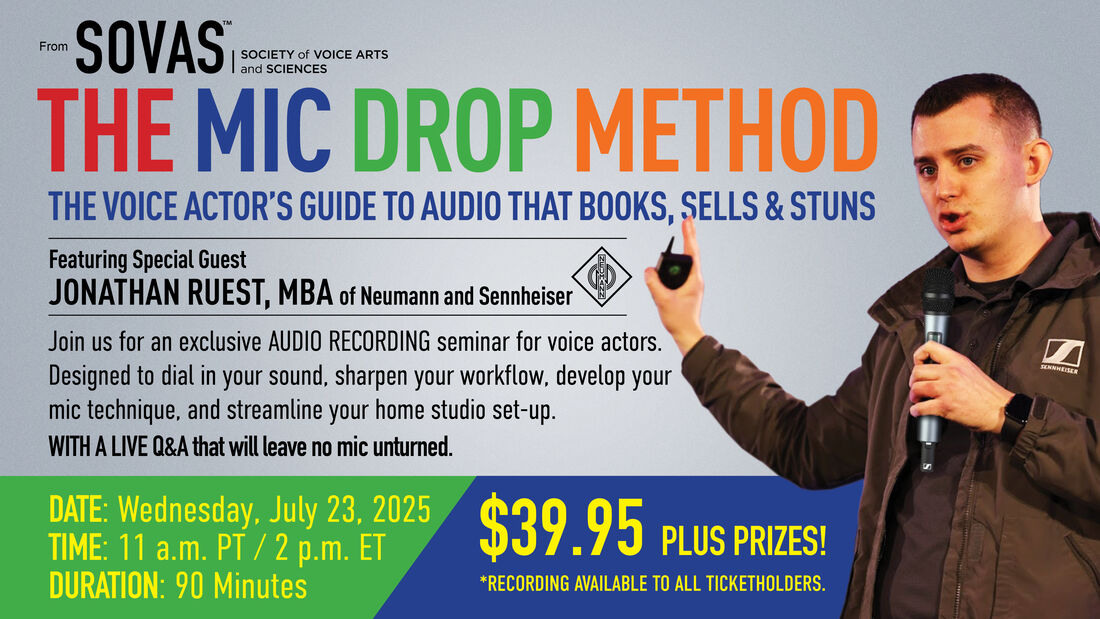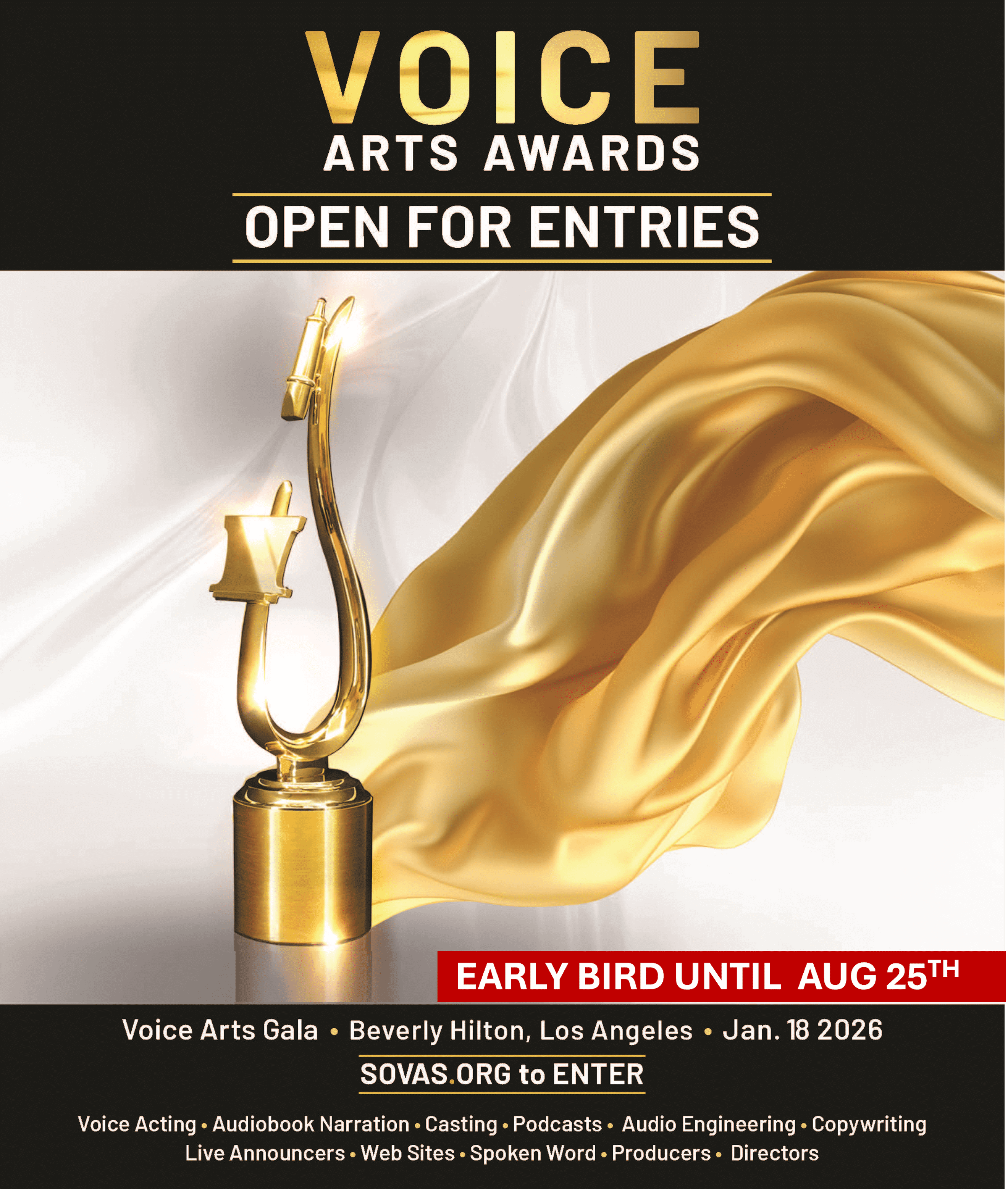Voice acting is a field in which finding a reliable source for routine information can be hard to come by. It’s even harder with social media making it possible for just about anyone to jump in with an opinion. Rather than answer questions, this month we’re taking a page from Jeopardy and starting with the answers. From the mouths of our students and expert colleagues, we have put together a short list of some of the worst career advice ever given to voice actors.
1. With a voice like yours, you should go into voiceover! This is easily the most common advice, even though it’s often meant more as a casual compliment. Even today’s least experienced voice actors know that there’s more to voice acting than your voice. In an ideal world, this advice would read more like the following: “With a voice like yours, plus your engaging personality, creative spirit, tenacity, open mindedness, strong work ethic, and courage to stand up under scrutiny, you should consider voiceover.”
2. You can practice by using the ads in magazines. The ads in magazines are meant to be read, not spoken. Further, they are written with the knowledge that the consumer is choosing to read them on his own time, at his own pace, hence they can be of any length. Radio and TV spots are typically confined to no more than 60 seconds and locked into a schedule set by the broadcaster. These scripts must instantly engage the listener and compel him to pay attention in the moment. The competencies and strategies involved in print ads and TV/radio ads are completely different. Except in ways too esoteric to explain here, you will not learn voice acting practicing with magazines ads.
3. You can learn everything you need to know by studying TV and radio commercials. Everything? First, how do you know which commercials are good or bad. Not every spot that makes it to air is up to standard. Many are subpar and will steer you down the wrong path. There is a great deal of complexity behind advertising. What you learn will be limited by what you understand about how commercials are developed and how they achieve their marketing goals. You can look at cakes in a bakery window, but that won’t teach you how to bake. Nevertheless, studying TV/radio commercials can be a good practice when taken with a grain of salt. In conjunction with a competent teacher, reviewing and analyzing commercials can be an extraordinary tool and will enhance your knowledge and performance acumen.
4. Find your niche, make a demo reel, and you’re on your way. Figuring out your voice, as it relates to voice acting, is a matter of training, thoughtful guidance, and diligent practice. There is much success and enjoyment to experience as you develop an awareness of your range and capabilities. There is no telling where your journey will lead. The last thing you want is to immediately box yourself into a niche. Others will be happy to do that for you. The niche(s) will find you. Your job, whether starting out or continuing to build on an existing career, is to continually grow and develop your performance skills, range, diversity, and malleability as an actor.
5. There’s too much competition to waste your time trying to succeed in voice acting. If you find yourself resonating with this rather cynical point of view, consider yourself lucky. You just learned that voice acting is not for you and can happily move on. Voice acting is for people who can tolerate a certain amount of risk and are not afraid of challenges. Those who do well possess a dynamic sense of themselves as winners. They tend to be those who operate with creative brio and have fun doing it. There is little if any personal or financial reward in finding a safe place to eke out a quiet living in your pajamas. You have to believe in yourself and your dreams. You have to take off the PJs, grab a shower, put on your street clothes, and get out there. After all, there are many successful voice actors and they got there by making the choice to succeed.
6. You don’t need an agent. They take 10 percent and do nothing for it. This is an uninformed point of view. Smile politely and move on. Agents are like angel investors but without the cash infusion. They risk their time, money, and reputations on the talent they send to their clients. How you perform as an actor reflects on the agency. Agenting is a respectable and difficult job. The fact that companies call the agent represents cash outlay for marketing, countless phones calls, careful networking, and building a track record of success. The agenting doesn’t stop when the talent books the job. From there, the agent must negotiate the best deal, provide bookkeeping, manage union protocol, put out fires, and collect payment. Putting aside the fact that you, the talent, wouldn’t have gotten the opportunity without the agent’s hard-earned advance work, keep in mind that you didn’t have to pay them to do it. Put your focus on what you do for your 90 percent of the pie. Keep improving and book the job.
7. If you’re serious about voice acting, the first thing you should do is set up a home studio. And so begins the destructive pattern of putting the cart before the horse—a pattern that seeps into your development process and wreaks havoc in all sorts of ways, including on your budget. A well-rounded voiceover education will guide you through a logical and effective sequence that supports your training and development. The basic building blocks (training, demo reel, marketing, and acquiring an agent) can morph according to the individual voice actor’s overall readiness and resources. It’s a delicate balancing act that’s different for each voice actor.
8. Stay away from conferences and networking events that charge you money. They’re all a scam. Conferences are not a new phenomenon. Most industries have them because they provide significant value. The goal is make them relevant to a particular industry and give the attendees more than they expected. Of course, conferences cost money! The sidewalk lemonade stand, run by your 10-year-old neighbor, costs money too. Conferences are businesses. You, as a voice actor, are also a business. Conferences are a great way to learn, share, flex your muscles, and gauge the marketplace. For some, the experience of getting into the mix and meeting new people is a life-affirming breakthrough.
In the interest of full disclosure, we, ourselves, are the founders of SOVAS, which organizes major voiceover events That’s Voiceover!, Voice Arts Awards, Speed Dating with Your Demo Reel, and Audition Spotlight.
There you have it. We hope these tidbits will sharpen your awareness for deciphering common sense information in support of your voice acting career.















Add Comment